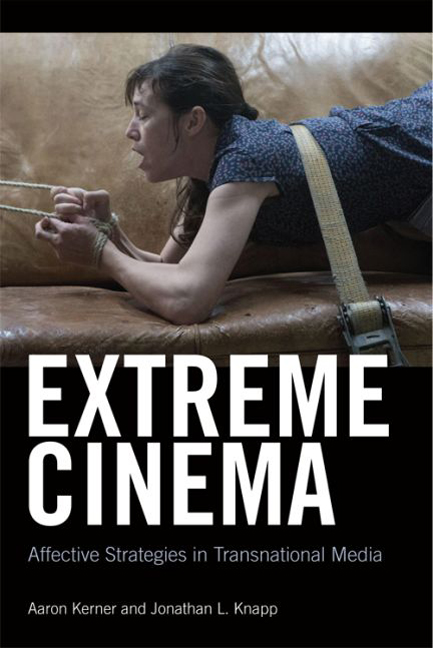Book contents
- Frontmatter
- Contents
- List of Figures
- Acknowledgments
- 1 Extreme Cinema: Revisiting Body Genres
- 2 Hearing: With a Touch of Sound—The Affective Charge of Audio Design
- 3 Pain: Exploring Bodies, Technology, and Endurance
- 4 Laughter: Belly-aching Laughter
- 5 Arousal: Graphic Encounters
- 6 Crying: Dreadful Melodramas—Family Dramas and Home Invasions
- 7 The End of Extreme Cinema?
- Bibliography
- Filmography
- Index
6 - Crying: Dreadful Melodramas—Family Dramas and Home Invasions
- Frontmatter
- Contents
- List of Figures
- Acknowledgments
- 1 Extreme Cinema: Revisiting Body Genres
- 2 Hearing: With a Touch of Sound—The Affective Charge of Audio Design
- 3 Pain: Exploring Bodies, Technology, and Endurance
- 4 Laughter: Belly-aching Laughter
- 5 Arousal: Graphic Encounters
- 6 Crying: Dreadful Melodramas—Family Dramas and Home Invasions
- 7 The End of Extreme Cinema?
- Bibliography
- Filmography
- Index
Summary
INTRODUCTION: CRY ME A PUDDLE (OF BLOOD)
Melodramas are family affairs—usually involving the destruction of the familial unit—that typically elicit tears from the spectator. And in the genre's insistence upon the discharge of bodily fluids from the spectator, melodrama shares certain affinities with pornography. Furthermore, like horror and pornography, melodrama nests its affecting ruptures within discrete numbers framed by otherwise conventional “realistic” narrative sequences. When conversing with his composer, Marvin Hamlisch, for Sophie's Choice (1982), Alan Pakula told him, “The film is so emotional, the film is about such horror, that it runs the great danger of becoming emotional pornography.” Sophie's choice— choosing which of her two children would be sent to the gas chamber—is terribly heart-wrenching, and it verges on the pornographic precisely because of the setting (the ultimate human horror of the concentration camp) and the fact that the entirety of the film rests on this single emotive moment.
Unlike pornography, horror, or other affecting instances in extreme cinema that might on their own carry a strong charge, the emotive events in melodrama generally cannot stand on their own and be as affecting as when seen in the context of the whole narrative. For instance, the concluding moments of Douglas Sirk's All That Heaven Allows (1955), if seen on their own, might strike the spectator as utterly pat—as they would not have any emotional investment in the unconscious man (Ron) and the doting woman (Cary). This is not to suggest that this holds across the board. It is certainly possible to take melodramatic scenes in isolation and discover that they are affecting. For instance, the heart-wrenching scene in Sophie's Choice on its own, in isolation from the narrative, wields the potential to spawn tears in the spectator. However, what this latter example demonstrates is that it is nonetheless laden with narrative, and is emotionally charged. There is within this isolated scene enough of a narrative arc—we are introduced to a mother and her children; the mother is compelled to make a choice; and it resolves (unhappily) in a choice being made. The “micro narrative” featuring the loss of a child offers enough narrative context for the spectator to become emotionally invested in the characters.
- Type
- Chapter
- Information
- Extreme CinemaAffective Strategies in Transnational Media, pp. 130 - 155Publisher: Edinburgh University PressPrint publication year: 2016



